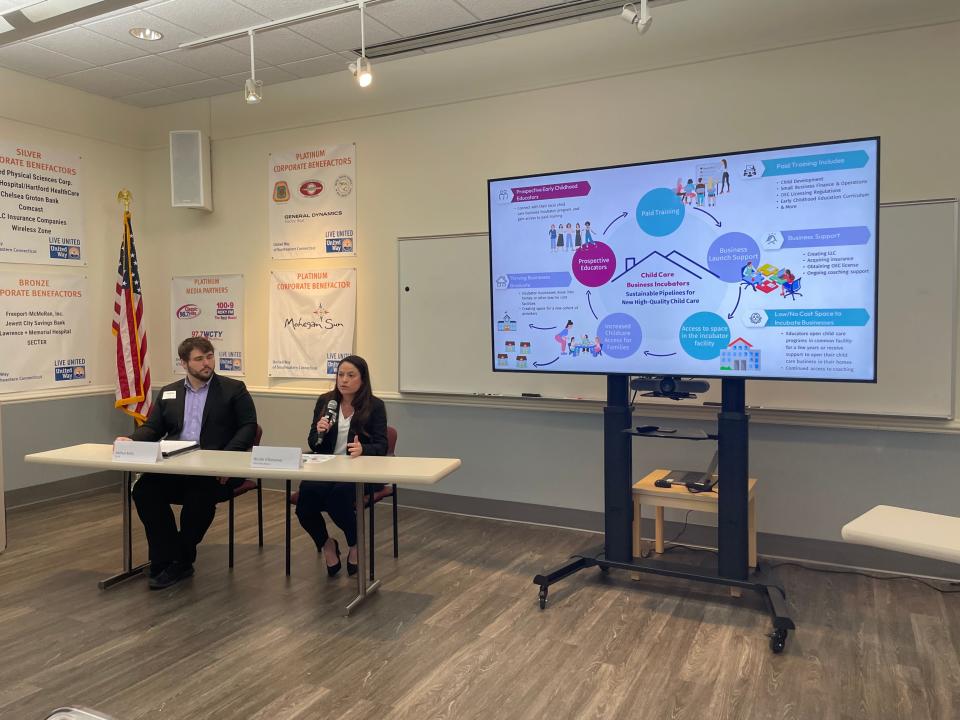The CT childcare crisis: Who is stepping up to solve the problem? What else is being done?
Affordable early childcare can be hard to come by in eastern Connecticut, but replicable solutions exist.
The “Addressing the Childcare Crisis: Strengthening Our Workforce” talk was hosted by the United Way of Southeastern Connecticut Monday. For-profit and nonprofit childcare providers, businesses, and other organizations came to talk about the issue.
“It will take individuals from all sectors to make this happen,“ United Way of Southeastern Connecticut CEO Dina Sears-Graves said.
In short, the childcare crisis is related to both the affordability and availability of care for children aged 5 and under. New London County currently has 4,571 child care slots, but needs 7,803 slots to meet demand. A greater demand is needed for infants and toddlers, as 49% of that demographic’s early childcare needs are unmet.

Incubator program designed to launch new childcare centers
The YWCA of New Britain started the Child Care Business Incubator to help fill a void in its area, as there are 11 children for every open seat in an early childcare program, YWCA Child Care Program Coordinator Nicole Villeneuve said.
In 2022, the YWCA found 10 women who wanted to start their own early childcare businesses as family home daycare providers. The women received four to five months of paid training, and support for launching their businesses. Four made it through the process to set up an incubator site, Villeneuve said.
The incubator building gives participants a classroom-sized space to run their childcare business. They can stay up to five years, and then find another space, or run their business from home, Villeneuve said.
Once the first cohort has moved on, the YWCA will find more participants, as the program has a waiting list, Villeneuve said.
More: A new Killingly child care center has a waitlist of 36 kids. How can CT solve this crisis?
If the program gets to New London County, the first person to enroll could be Heydi Mercedes, Adult and Family Division Manager of Norwich Human Services. Mercedes sees her clients’ difficulties in securing affordable childcare. Assistance often requires parents to be employed for approval, but an unemployed parent might not be able to work until they have childcare, she said.
Mercedes also sometimes misses work to be with her toddler son on days the childcare facility she uses, Thames Valley Council for Community Action's (TVCCA) Little Learners, isn’t open. Yet, she still pays as much for childcare as she does on her mortgage, she said.
“I want to be at home with my child while helping other parents,” Mercedes said.
Proposed state legislation that can help create childcare business incubators include HB5051, SB249 and SB286. HB5051 limits incubators to one per town in New London County and other specific towns. That program would end June 30, 2026. SB249 would allow up to 20 childcare incubator facilities in the state, and has no sunset date. SB286 allows any number of childcare incubators anywhere in the state, but licenses under this provision last only four years, the presentation states.
Addressing affordability of childcare
The tri-share child care model, already used in Michigan, tackles affordability problems. Employers, employees and the state evenly split costs, while a statewide or regional organization administers the program, the presentation states.
Employers benefit through improved recruitment and retention. Child care providers benefit through reliable payments and growth of services. Working parents benefit from financial relief, a barrier removed, and improved work-life balance.
Businesses regularly cite childcare as one cause for workforce issues in recent years. With 90,000 open jobs in Connecticut, women leaving the workforce to take care of their children is unsustainable, CBIA Advocacy Outreach Manager Paul Amarone said.
Two proposed bills in the Connecticut General Assembly would help the tri-share model. One is HB 5002, which would establish a pilot tri-share model in New London County, which would extend eligibility to the Asset Limited, Income Constrained, Employed, or ALICE, population. It would also incorporate a fund open to private investment. It would start with a $50 million transfer from the general fund. The state bond commission can issue up to $50 million in additional funding, the presentation stated.
The other bill is HB 5051, which establishes tri-share for families qualified for the Care4Kids program. American Rescue Plan Act funds form the initial investment, the presentation states.
Non-profit employers may find it difficult to afford, or can’t afford, the tri-share model, UCFS President and CEO Jennifer Granger said.
The start of the tri-share model would only be a pilot program, and can be adjusted as time goes on. Solving the childcare problem will also need multiple solutions, including the incubators, job training, and more, Aramone said.
Other pieces of the puzzle
Another state legislative item seeking approval is HB5023, which would provide $13 million for TVCCA to build a new child care center in Groton. The new facility would increase TVCCA’s childcare slots in Groton from 86 to 150, and create 20 jobs, TVCCA CEO Josh Kelly said.
United Way of Southeastern Connecticut will also convene a work group to help solve childcare hiring issues, Sears- Graves said.
At the end of the talk, Childcare for Connecticut’s Future Director Eva Bermúdez Zimmerman encouraged businesses and parents, to support the pro-childcare legislation, and participate in the third Morning Without Child Care Rally, to be held April 3 across the state.
This article originally appeared on The Bulletin: Ways to address the childcare crisis in New London County

